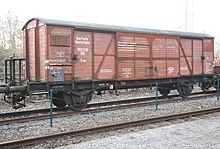Class district

Wagon of the class district "Trier" (ferry van)
Class districts (German: Gattungsbezirke) were a classification system for railway goods wagons used by the Deutsche Reichsbahn (1920–1945) in Germany between the wars.[1]
After the Deutsche Reichsbahn had been founded in 1920, in 1921 all goods wagons types with the same or similar roles were grouped into so-called class districts. These were named after cities that were the headquarters of a Reichsbahn division or, later, other cities too. Work on re-lettering and renaming the wagons began in 1922 and was largely completed by 1924.
| Class districts | Category letters | Wagon type | Class | Period |
|---|---|---|---|---|
| Altona, later Hamburg | V | Livestock van | S, V, A, W | 1922–1937 |
| Augsburg | S | Two and three-axled rail wagons | S, V, A, W | 1922–1945 |
| Berlin | Gk | Refrigerator vans | S, V, A, W | 1922–1945 |
| Breslau | Om | Open wagons | S, V, A, W | 1922–1945 |
| Dresden | G und GG | Large-volume vans | S, V, A, W | 1922–1945 |
| Elberfeld, later Wuppertal | K | Lidded wagons | S, V, A | 1922–1930 |
| Erfurt | X | Open departmental wagons | S, V, A, W | 1922–1945 |
| Essen | Om | Open wagons | V, W | 1922–1945 |
| Kassel (Cassel) | G | Covered wagons | V, A | 1922–1945 |
| Köln | SS | Rail wagons with four or more axles (flat wagons) | S, V, A, W | 1922–1945 |
| München | G | Covered wagons | Verbandsbauart | 1922–1945 |
| Nürnberg | O | Open wagons | Verbandsbauart | 1922–1945 |
| Regensburg | H | Cradle wagons | S, V, A | 1922–1945 |
| Stuttgart | R | Stake wagons | S, V, A, W | 1922–1945 |
Legende:
- S = State railways
- V = Verbandsbauart
- A = Austauschbauart
- W = Welded
See also[]
- Additional class districts from 1926
- Additional class districts from 1935
- Additional class districts from 1942
References[]
- ^ Deutsche Reichsbahn Güterwagen at web.hs-merseburg.de. Retrieved 19 Jun 2019
Categories:
- Rail freight transport
- Rail technologies
- Rail transport in Germany